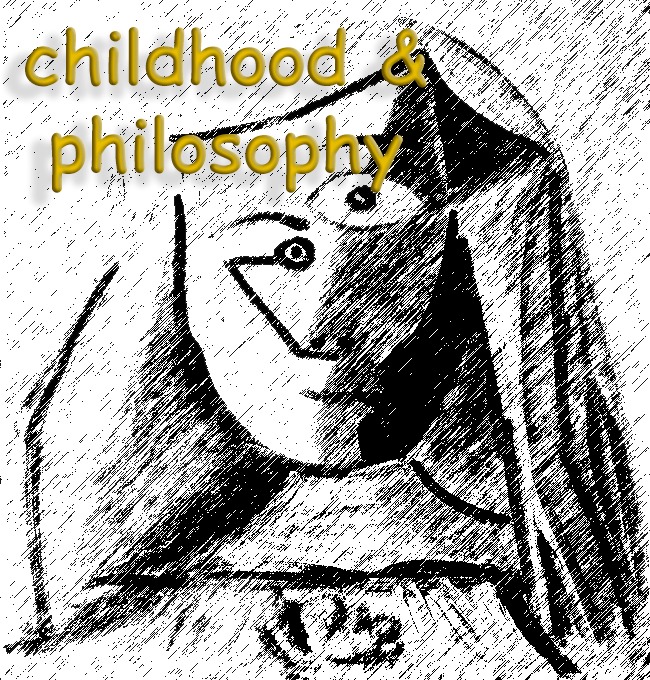authenticity as an inarticulate ideal in the contemporary discourse of good childhoods
DOI:
https://doi.org/10.12957/childphilo.2021.55770Keywords:
childhood, authenticity, moral-psychology, personal projects.Abstract
This paper consists of an initial investigation about the meaning of a good childhood following the ethical ideal of authenticity. In this introduction to a philosophy of childhood and authenticity, the central theme is to investigate how the authenticity ideal is already presupposed in the contemporary discourse on what constitutes a good childhood. In the emerging field of philosophy of childhood, the capacities of children for agency, autonomy, and committing and the fundamental role of parents in guaranteeing possibilities to exercise them are being increasingly highlighted, together with a discourse that there are some intrinsic goods of childhood. These developments parallel contemporary reconstructions of authenticity as an ethical ideal. Current debates emphasize the importance of a person finding, creating and constructing their originality, and how to realize it. At the same time, this search must recognize demands emanating from something more than human desires: from one’s culture and community. The parallel dynamics between these two discourses - children-parent and individual-society - point to a direction that applying the concept of authenticity to the construction of novel interpretations and practices of a good childhood can bring fruitful results. After examining such parallels, some of these practices that emerge from the analysis of good childhoods as authentic childhood are pointed out, such as the importance of cultivating children’s moments of caring and committing, and the development of personal projects. The paper concludes by exploring some limitations of the applied methodology and how it can be a strength in future research on this topic.Downloads
References
Ariès, Phillipe. Centuries of Childhood. New York: Random House, 1962.
Bagattini, Alexander. Future-Oriented Paternalism and the Intrinsic Goods of Childhood. In: Bagattini, Alexander; Macleod, Colin (eds). The Nature of Children's Well-Being. Theory and Practice. Dordrecht: Springer, 2015. p. 17-33.
BaueR, Katharina. To be or Not to be Authentic. In Defense of Authenticity as an Ethical Ideal. Ethical Theory and Moral Practice, v. 20, n. 3, p. 567–580, Mar./Jun. 2017.
Betzler, Monika. Enhancing the Capacity for Autonomy: What Parents Owe Their Children to Make Their Lives Go Well. In: Bagattini, Alexander; Macleod, Colin (eds). The Nature of Children's Well-Being. Theory and Practice. Dordrecht: Springer, 2015. p. 65-84.
Bialystok, Lauren. Authenticity and the Limits of Philosophy. Dialogue, v. 53, n. 2, p. 271–298, Jan./Jun. 2014.
Bloom, Allan. The Closing of the American Mind. New York: Simon and Schuster, 1987.
Bou-Habib, Paul.; Olsaretti, Serena. Autonomy and Children’s Well-Being. In: Bagattini, Alexander; Macleod, Colin (eds). The Nature of Children's Well-Being. Theory and Practice. Dordrecht: Springer, 2015. p. 15-33.
Brennan, Samantha. The Goods of Childhood and Children’s Rights. In: Baylis, Francoise; Mcleod, Colin (eds.). Family-Making: Contemporary Ethical Challenges, Oxford: Oxford University Press, 2014, p. 29-47.
Frankfurt, Harry. The Importance of What We Care About. Cambridge, Cambridge University Press, 1988.
Frankfurt, Harry. Taking Ourselves Seriously and Getting it Right. Stanford: Stanford University Press, 2006.
Gheaus, Anca. The ‘Intrinsic Goods of Childhood’ and the Just Society. In: Bagattini, Alexander; Macleod, Colin (eds). The Nature of Children's Well-Being. Theory and Practice. Dordrecht: Springer, 2015. p. 35-52.
Gheaus, Anca; Wispelaere, Jurgen. The Routledge Handbook of the Philosophy of Childhood and Children. Abingdon: Routledge, 2019.
Golomb, Jacob. In Search of Authenticity from Kierkegaard to Camus. London and New York: Routledge, 1995.
Guignon, Charles. On Being Authentic. London: Routledge, 2004.
Lasch, Cristopher. The Culture of Narcissism: American Life in an Age of Diminishing Expectations. New York: Norton, 1979.
Matthews, Gareth. Philosophy and the Young Child. Cambridge and London: Harvard University Press, 1980.
Matthews, Gareth. The Philosophy of Childhood. Cambridge: Harvard University Press, 1994
Matthews, Gareth.; Mullin, Amy. The Philosophy of Childhood. Stanford Encyclopedia of Philosophy, oct. 2018. Available at <https://plato.stanford.edu/entries/childhood>. Accessed on: August 30th, 2020.
Mullin, Amy. Children, Autonomy and Care. Journal of Social Philosophy, v. 38, n. 4, p. 536–553, Nov. 2007
Mullin, Amy. Children, paternalism and the development of autonomy. Ethical Theory and Moral Practice, v. 17, n. 3, p. 413–426, Aug. 2013/Jun. 2014.
Rorty, Richard. Contingency, Irony and Solidarity. Cambridge: Cambridge University Press, 1989.
Shoemaker, David. Responsibility From the Margins. Oxford: Oxford University Press, 2015
Simms, Eva. The child in the world: Embodiment, time, and language in early childhood. Detroit Wayne State University Press, 2008.
Taylor, Charles. Sources of the Self. The Making of the Modern Identity. Cambridge: Cambridge University Press, 1989.
Taylor, Charles. The Ethics of Authenticity. Cambridge: Harvard University Press, 1991.
Taylor, Charles. A Secular Age. Cambridge: Harvard University Press, 2007.
Traina, Cristina. Children and Moral Agency. Journal of the Society of Christian Ethics, v. 29, n. 2, p. 19–37, Fall / Winter 2009
Varga, Somogy. Authenticity as an Ethical Ideal. New York: Routledge, 2011.
Varga, Somogy. Core identifications: the motives that really “speak for us”. Am Philos Q, v. 42, n. 4, p. 301–317, Oct. 2015.
Varga, Somogy; Guignon, Charles. Authenticity. Stanford Encyclopedia of Philosophy, Feb. 2020. Available at <https://plato.stanford.edu/entries/authenticity>. Accessed on: August 30th, 2020.




